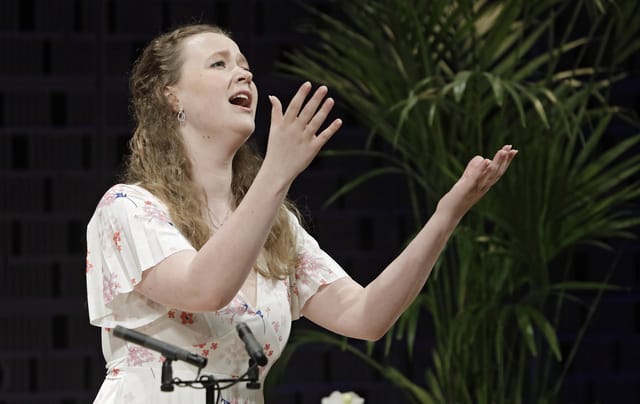Presenting a Wagnerian particle physicist and an early music specialist
21 May 2019
There was a steady buzz of anticipation in the lower foyer of Helsinki Music Centre Monday morning. A fair amount of excited audience members had come to the Camerata hall to hear the first notes of the Mirjam Helin Competition.

Among the first singers was Swedish soprano Jessica Elevant (b. 1990), whose interpretation of Elisabeth’s aria Dich, teure Halle from Wagner’s Tannhäuser was noted with enthusiasm by the audience. “I love Wagner, and it is a piece that simply makes everyone feel happy.” Elevant has also been awarded a Wagner scholarship for the Bayreuth Festival and, in 2018, she won the Karlsruhe Wagnerstimmen Competition.
Before embarking on a singing career, however, Elevant was studying physics. “In 2014, I started to prepare a doctor’s thesis in theoretical particle physics in Stockholm. But something did not feel quite right. Then in 2016, when a former singing teacher of mine asked me to join an opera choir for the summer, everything fell into place perfectly. While beginning my studies as a singer, I also managed to get a licentiate degree in physics.”
Elevant has thought a lot about the difference between the careers of a scientist and a singer. “Discipline is a relevant skill in both fields. But whereas a physicist sits alone with his code, everything in singing has to do with communication. This work is a joy, and you have to learn to throw yourself into it.”
The Ukrainian baritone Yuriy Hadzetskyy (b. 1992) was delighted to perform early on in the preliminary round. “Waiting is always a bit painful. This competition has a very friendly atmosphere, and I really felt the presence of the audience today – it almost seemed more like a concert than a competition.”
Interestingly, the mentor of Hadzetskyy in the Opera Academy at the Polish National Opera is Olga Pasichnyk, who was awarded the second prize at the 1999 Mirjam Helin Competition. “Prestigious competitions like this one, or the Queen Elizabeth Competition in Belgium, where I participated last year, prepare you for the big stages. That is why they are worth participating.”
In his studies, Hadzetsky has been especially interested in early music. Accordingly, his choice for the baroque aria in the preliminary round, an aria from C.H. Graun’s oratorio Der Tod Jesu, was not a usual one. “The work is from the year 1755, so it barely qualified for the requirement of a composition from before 1760”, says Hadzetskyy, laughing. “Right from the beginning of my studies I was involved with the early music group A capella Leopolis.” The repertoire of this ensemble is special: it focuses mainly on Ukrainian, Polish and Bulgarian early music. “Early music is my favourite style. In the meantime, however, my love for Mozart has stayed with me. And nowadays I am also interested in Romantic Lied and Modern music.”
Text: Justus Pitkänen
